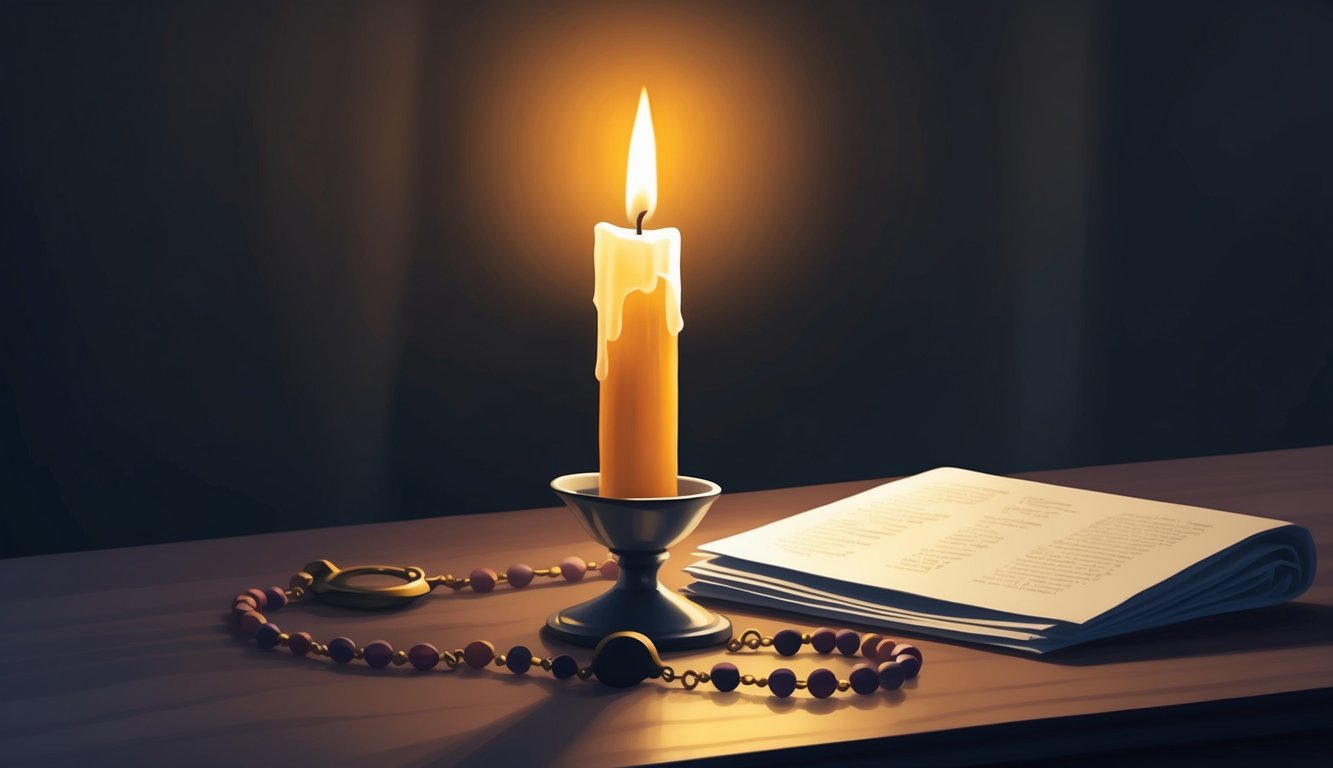Don’t Miss Out On This Unique Astrological Opportunity
Are you tired of spinning your wheels and getting nowhere? Simply put, you’re out of sync: you’re out of alignment with your astral configuration.
But: there’s a kind of map that can help you reclaim your alignment. Think of it as your own personal blueprint to success and happiness: a blueprint that will help you live your most amazing life.
Get started here.
Night prayers hold a special place in the Catholic tradition.
They offer a moment of reflection and connection with faith at the end of the day. Night Prayer Catholic involves a structured set of prayers that allows you to seek peace, express gratitude, and ask for God’s guidance and protection through the night. These prayers create a serene ending to your day, supporting spiritual growth and a closer relationship with God.
By engaging in night prayer, you embrace a practice filled with meaning and solace.
This nightly ritual often includes various components such as thanking God for the day’s blessings, seeking forgiveness for any wrongs, and offering personal intentions or needs.
Night prayer strengthens your bond with faith and reinforces a sense of calm and security.
Adding personal touches to your night prayer practice can make it even more meaningful.
Whether you wish to pray for loved ones, special intentions, or simply find peace after a long day, customizing your prayers can enhance your spiritual journey and deepen your connection to God.
Key Takeaways
- Night prayer offers peace and connection with God.
- It includes expressions of gratitude and personal intentions.
- Personalizing the practice enhances spiritual growth.
The Significance of Night Prayer in Catholic Tradition
Night prayer, also known as Compline, holds a vital place in Catholic tradition.
It offers a moment of reflection and connection with God before sleep.
This practice, rich in history and spiritual significance, aims to provide peaceful sleep and divine protection.
Historical Context and Foundations
Night prayer has ancient roots in the Catholic Church.
Early Christians believed in the power of prayer at night to seek protection and peace.
This tradition draws from scriptural teachings and has been an integral part of the faith, helping believers connect with God at the end of the day.
The prayer tradition evolved over time, emphasizing the importance of ending the day by recalling God’s presence.
Early monastic communities adapted these practices, incorporating structured prayers.
This laid the groundwork for the rituals observed today.
Night prayer invites you to pause and embrace a moment of stillness with the Lord, preparing your spirit for rest.
Compline: Ending the Day with Prayer
Compline is a specific form of night prayer, marking the final hour of the day’s liturgical prayers.
This practice involves chanting or reciting Psalms, hymns, and readings from scripture.
The aim is to instill peace and readiness for God’s protection through the night.
At its core, Compline focuses on seeking forgiveness and expressing gratitude.
It acknowledges human vulnerability and places trust in divine care.
This routine wraps up your day with comfort, aligning thoughts with God’s peace.
Compline offers you a structured way to release worries and invite a serene transition into sleep.
Components of the Catholic Night Prayer
Catholic Night Prayer includes vital practices that guide you to reflect, seek forgiveness, offer gratitude, and express your needs to God.
The following components ensure a comprehensive and fulfilling prayer experience.
Examination of Conscience
The Examination of Conscience is a time to reflect on your day, noting where you have succeeded in virtues and where you may have faltered.
You look back over your actions, thoughts, and words, identifying instances of sin or moments you fell short of living as Christ would.
This reflection encourages growth and awareness, helping you to understand areas that may need improvement.
By regularly practicing this examination, you become more attuned to living a life reflecting the teachings of Jesus, making it a fundamental part of the night prayer.
Act of Contrition
An important step in your nightly routine is the Act of Contrition.
This prayer is where you seek forgiveness for any wrongs or sins committed throughout the day.
A heartfelt Act of Contrition brings you closer to God, acknowledging where you’ve gone astray.
The sincerity of this prayer is key, as you express genuine remorse and a desire to amend your ways.
This act not only cleanses your conscience but also fosters a deeper relationship with the Lord Jesus Christ, who offers forgiveness and understanding.
Reciting Psalms and Canticles
The recitation of psalms and canticles forms another crucial part of your night prayer.
These meditative verses from scripture are an opportunity to connect with God’s word.
Psalms often express a range of emotions, from praise and thanksgiving to sorrow and petitions for help.
By incorporating these into your prayer, you reflect on God’s greatness and mercy while also finding personal solace and strength.
The rhythm and poetry of these texts can help you feel spiritually nurtured as you end your day.
Thanksgiving and Petitions
Ending your night prayer with thanksgiving and petitions allows you to express gratitude and seek God’s guidance.
In this moment, thank the Lord for the blessings experienced, no matter how small they might seem.
This gratitude nurtures a positive outlook and acknowledges God’s role in your life.
After thanksgiving, present your petitions—requests for help, strength, or blessings for yourself and others.
This dialogue deepens your connection with God, reinforcing trust in His plan and love.
This part of the prayer is a reminder of your dependence on divine support.
Night Prayers for Special Intentions

Night prayers can bring comfort and peace to those seeking protection or blessings.
You can offer prayers for protection, healing, and support for loved ones.
These prayers help guide your heart and focus your intentions on specific needs.
Protection from Evil and Nightly Fears
You can pray for safety through the night and ask for protection from evil forces.
Calling on your Guardian Angel can help provide comfort.
You may want to ask God for strength and courage to face any fear.
Consider praying to Saint Michael for protection, as he is known for fighting evil.
A simple prayer might include thanking the Lord for his presence and asking for a peaceful night’s rest.
Light a candle or use a rosary to keep you focused during your prayer.
Seeking the blessings of the saints is another way to strengthen your prayer for protection.
Prayers for the Sick and Suffering
When praying for the sick and suffering, you can focus on requesting healing and comfort. God’s love is often called upon to support those in pain.
You might wish to mention specific names of those who need healing during your prayer.
Praying the Rosary or Hail Marys can bring comfort to you and those you pray for.
Remember to ask the saints to intercede on behalf of the sick ones. Saint Raphael, known for healing, can be asked for assistance.
Sharing these prayers with others can help build a supportive community around those who are suffering.
Intercessions for Family and Loved Ones
When praying for family and loved ones, express your wish for their safety and happiness. God’s guidance and blessings are often asked for, to support their well-being.
You can also pray for unity and love to strengthen family bonds.
The Lord’s Prayer can be a meaningful way to ask for peace and protection for your loved ones.
You might even personalize the prayer by including specific needs or situations.
Inviting the saints, like Saint Joseph, to watch over and protect your family can also bring reassurance.
Family rosary prayers are a cherished way to gather and focus on collective needs.
Personalizing Your Night Prayer Practice

Adapting your night prayer practice can deeply enhance your spiritual journey.
Focusing on individual needs and incorporating elements like silence and meditation can make these moments more meaningful and enriching.
By personalizing your evening prayer today, you create a sacred space that aligns with your spiritual aspirations.
This intentional approach allows for deeper reflection, fostering a sense of peace and gratitude before rest.
Embracing this practice consistently can strengthen your connection to faith and inner tranquility.
Adaptation to Individual Needs and Experiences
Your personal prayer should reflect your unique journey and life’s experiences.
Instead of sticking to a strict routine, allow your prayer to evolve, meeting both your changing needs and spiritual goals.
Think about what aspects of your life need guidance or comfort from the Holy Spirit and incorporate these into your prayers.
Be open to different types of prayers or passages that speak to you.
Over time, this approach can lead to a more personal connection with Almighty God.
This will help nurture your soul, offering rest and peace during the night.
Incorporating Silence and Meditation
Including moments of silence and meditation can greatly enhance your night prayer experience.
Silence allows you to listen for guidance from the Holy Spirit, creating a space where you can truly reflect and find peace.
Begin with a few minutes of stillness, focusing on your breathing or a calming image.
Meditation during prayer can involve visualizing scenes from religious texts or repeating a meaningful phrase slowly.
This practice not only calms the mind but also invites a deeper connection with the divine.
Over time, these quiet moments can lead to a profound sense of rest and spiritual fulfillment.
Frequently Asked Questions

This section addresses common queries about Catholic night prayers.
You’ll discover popular prayers for bedtime, methods of practicing the Liturgy of the Hours, and options for family prayers.
What is the best Catholic prayer before bed?
Many Catholics recite the “Our Father” before bedtime as a way to seek protection and guidance.
Another popular choice is the “Hail Mary,” which is often used to ask for Mary’s intercession and peace during the night.
What is a powerful Catholic evening prayer?
The “Examen” prayer is a powerful evening ritual.
It involves reflecting on the day’s events, expressing gratitude, and seeking forgiveness for any shortcomings.
This prayer helps you find peace before sleep.
What prayer did Jesus say before bed?
Though specific bedtime prayers by Jesus aren’t recorded in the Gospels, He often prayed to God, reflecting on His day.
The “Our Father,” taught by Jesus Himself, is often seen as a fundamental part of Christian prayer life.
How do Catholics pray the Liturgy of the Hours at night?
Catholics often pray the Liturgy of the Hours through the Compline.
This includes prayers like the “Night Prayer” or “Prayer Before Sleep.” The Compline is designed to close the day with a peaceful mindset.
What are some short night prayers for Catholics?
Short prayers such as “Jesus, Mary, and Joseph, I give you my heart and my soul,” or “Angel of God, my guardian dear, to whom God’s love commits me here,” are simple and easy to remember.
They provide comfort and protection throughout the night.
Can you provide a collection of Catholic night prayers for families?
A collection for families might include the “Our Father,” “Hail Mary,” and a family blessing prayer.
Prayers from Eucharistic Adoration can also be adapted for family use before bed, helping to foster a sense of togetherness and faith.



